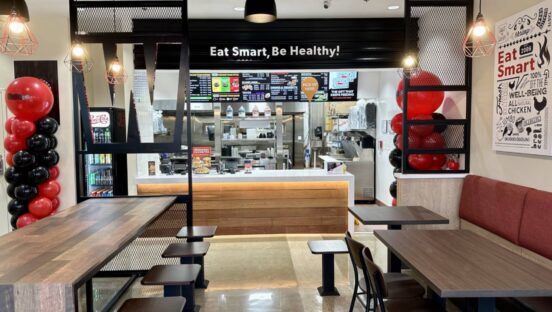While the U.S. limited-service restaurant industry was founded on American favorites like burgers, sandwiches, and pizza (yes, we’re counting pizza as American for our purposes here), the flood of chefs pouring into the fast-casual category has brought with it a global flair.
These days, chefs are serving everything from Peruvian rotisserie and Jamaican jerk chicken to Italian semolina pasta and Turkish lamb kebabs in multiunit fast-casual restaurants.
Take Heritage Eats, a Napa, California–based Fast Casual 2.0 brand, as an example of this global flair. The soon-to-be one-year-old concept designed its menu around seven “Good Calls” signature items, each of which is inspired by a different country’s cuisine.
“Our big focus is on globally inspired food from around the world,” says Jason Kupper, cofounder and executive chef at Heritage Eats. “It’s a big emphasis on globally inspired dishes, but tying in local ingredients. It’s not a pretentious menu by any means; it’s fun loving, and there’s a little bit of everything for anyone that comes in the door. There are not too many guests who leave here feeling like they couldn’t find something to eat.”
Heritage Eats’ Good Calls include a Jamaican Bao with jerk chicken, cabbage slaw, Asian pickle, and pineapple habanero sauce on steamed buns; Braised Pork Tacos with pico de gallo, cabbage slaw, roasted corn, edamame, salsa roja, and lime crema; and a Crispy Falafel Pita with chickpea falafel, cabbage slaw, hummus, and lemon tahini sauce.
Kupper, who founded Heritage Eats with business partner Ben Koenig after stints at fine-dining restaurants like Thomas Keller’s Bouchon, is part of a new generation of chefs who see opportunity in fast casual—opportunity to reach a wider mass of customers while having greater influence over the quality of the food Americans eat. While chefs like Chipotle’s Steve Ells first entered fast casual in the ’90s, the trend has ramped up in the last five years as the fast-casual category has exploded and the American palate has been more accepting of upscale and adventurous foods.
The National Restaurant Association projected in its 2016 Industry Forecast that chef-driven fast casuals would be the No. 2 menu trend of the year, behind only locally sourced meats and seafood.
This popularity is increasing the conversation among the chef community about how to innovate with flavors and sourcing practices within a multiunit fast-casual chain. It’s a conversation QSR is taking to chefs next month at the Culinary Institute of America’s Worlds of Flavor, a forum on world cuisines, food cultures, and flavor trends hosted at the school’s campus in St. Helena, California.
This year’s 18th annual Worlds of Flavor carries the theme “On Fire: Culture, Passion, and Invention from Europe and the Americas.” QSR will be on hand to host a panel on the chef influence in fast casual, titled “From the Ground Up: Serving Fresh Ingredients in High Volume Through Fast Casual.” The panel will feature Kupper; Nate Weir, culinary director at Modern Market; Mike Rypka, founder of Torchy’s Tacos; and Gerard Craft, founder of Porano Pasta.
Craft, a James Beard–winning chef from St. Louis, says he was encouraged to open Porano, a build-your-own-bowl concept, after traveling in Italy. But he says he also wanted to open a quick-service concept to prove that wholesome, conscious ingredients could be served in a fast setting.
“We’re a group of a ton of chefs, and we like to play around with food and think outside the box with food, so it’s a really good challenge for us,” Craft says of his team of chefs at Niche Food Group. “I think we all feel passionately about the reason we’re going down this road. I think we’re all really scared about what we see in the food world, and we’d like to be a part of changing that.”
He adds that Porano will source several ingredients seasonally, while also striving to source many ingredients locally, leveraging the supply chain at his fine-dining restaurants.
“We look at the food system and how messed up it is, and the pipeline used for ingredients within fast food, and I think that’s become something that’s really important for us: where we’re getting our ingredients,” he says. “We need to make it the same as if we were getting ingredients for any one of our other restaurants.”
Seasonal and local sourcing are also important to Kupper and Koenig at Heritage Eats. The concept sources several ingredients from nearby California farmers and develops seasonal menu items based on available supply.
“I think it’s still the fine-dining mentality: We want to keep with the seasons, and if there are problems with the supply of what we have, then we’re flexible,” Kupper says. “Nothing is set in stone. If we’re going to have a problem getting a certain protein, then it might have to come off the menu.
“We really want to make everything as authentic as possible,” he adds. “We’re not trying to serve dishes you see everywhere else. We’re trying to do things that are cutting edge in our mind and that bring authenticity.”
Want to learn more about how chefs are influencing the fast-casual industry and bringing a global flair to the category? Click here to learn more about Worlds of Flavor and to register for next month’s conference. Also, check out QSR’s April issue for more information on how chefs are innovating with flavors in fast casuals.






